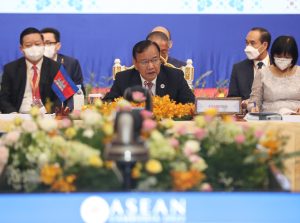Cambodia this week confirmed that Senior Gen. Min Aung Hlaing, the head of Myanmar’s military junta, will not be invited to next month’s Association of Southeast Asian Nations (ASEAN) summit in Phnom Penh.
Agence France-Presse reported yesterday that the country’s administration would only be permitted to send a “non-political representative” to the summit and related meetings, which are due to be held on November 8-13.
Linking the invitation to “progress in the implementation of the Five-Point Consensus,” an ASEAN peace plan, a Cambodian foreign ministry spokesperson told the news agency that the junta had been invited to “nominate a non-political representative for the upcoming ASEAN Summits.”
The Cambodian move is not unexpected. Despite Myanmar’s descent into nationwide conflict and economic dysfunction, the military administration has shown virtually no commitment to the Five-Point Consensus, which was agreed upon at a special meeting in April 2021, two months after the military launched a coup and overthrew the elected National League for Democracy (NLD) government.
For this reason, political representatives of the military-backed State Administration Council (SAC) have been excluded from high-level meetings of the bloc. Min Aung Hlaing was excluded from the virtual ASEAN Summit that was hosted by Brunei in October 2021, and the military junta’s appointed foreign minister, Wunna Maung Lwin, was similarly barred from attending meetings of the bloc’s foreign ministers in Phnom Penh in February and August.
But the military junta’s exclusion or non-invitation to the upcoming summit is now the baseline for ASEAN, and the question is whether the bloc’s member states will go any further in proscribing the military junta. For more than a year, certain ASEAN member states – particularly Malaysia and Indonesia – have expressed open frustration with the military’s obduracy, and its seeming contempt for the Five-Point Consensus.
Far from adhering to the plan’s call for an immediate end to violence and dialogue between “all parties” to the country’s conflict, the military junta has redoubled its attacks on resistance forces and civilian forces believed to be harboring them, and refused to deal with any opposition forces, which it has described as “terrorists.”
A tipping point appeared to have been reached prior to the ASEAN Foreign Ministers’ Meeting in August, when the military junta executed four political prisoners, in a marked escalation of its campaign of terror against the resistance. The executions prompted even the Cambodian government, which as this year’s chair of ASEAN had initially hoped to pursue a policy of pragmatic engagement with the military, to condemn its “gross lack of will” to implement the Five-Point Consensus.
The joint communique released at the end of the meeting recommended that the military junta’s adherence to the Five-Point Consensus be reviewed at the ASEAN Summit in November.
The weeks leading up to the summit, therefore, shape as a crucial time for ASEAN, during which it will be forced to reassess its approach toward the country’s interlocking crises, ask hard questions about the viability of the Five-Point Consensus, and, if necessary, to formulate an alternative way forward.
The primary driving force in pushing these questions to the fore has been Malaysia’s Foreign Minister Saifuddin Abdullah. As the situation inside Myanmar has deteriorated, Saifuddin has become more vocal in his insistence that ASEAN open direct channels to the National Unity Government (NUG), which is spearheading the resistance to the military junta.
“Between now and the ASEAN summit in November ASEAN must seriously review if the Five-Point Consensus is still relevant, and if it should be replaced with something better,” Saifuddin told the media last month, after meeting with members of the NUG on the sidelines of the United Nations General Assembly in New York. “By the time we meet in November, we must ask that hard question and we must have the answer during that time.”
Given that all of these decisions can only be made on the basis of consensus, the coming weeks will offer a possibly binding decision the bloc’s eight remaining member states share the Malaysian envoy’s sense of urgency.

































